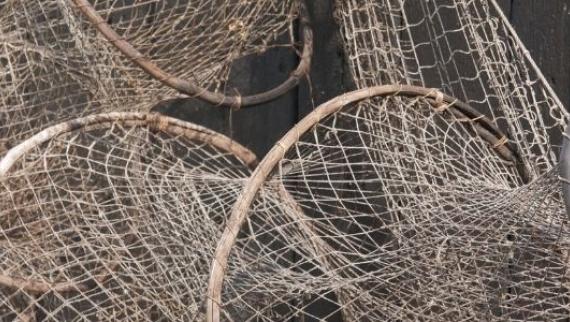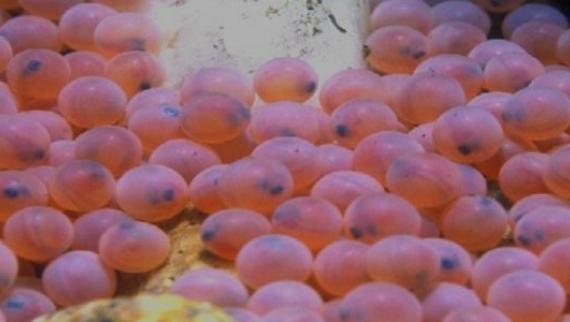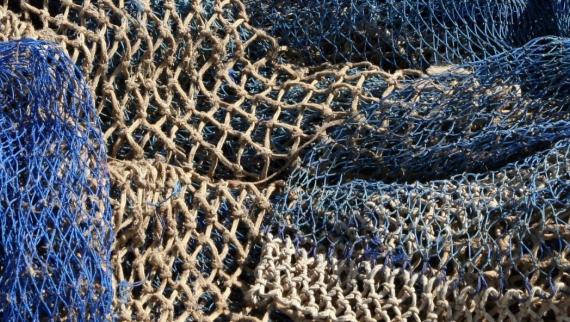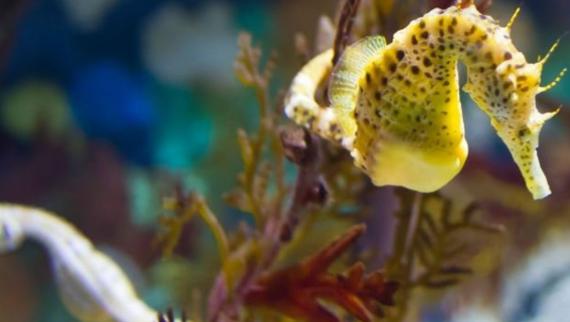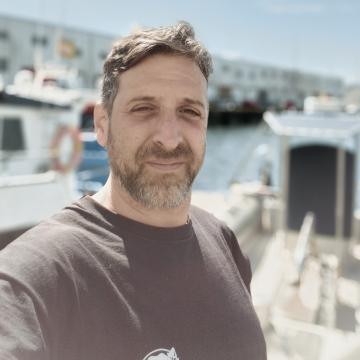Marine Ecology & Resources
All living beings, including those living underwater, have an intricate relationship with their environment and with other living beings around them. Unveiling this complex network is essential to progress towards a sustainable society.
By studying the complex relations among all nodes in the ecosystem, the Marine Ecology & Resources research group, also known as ‘ERM’, aims to develop a holistic approach to marine ecological studies.
Its philosophy is as follows: if we know how all the pieces of the ecosystem work together in nature and how they interact with society, we’ll find ways to better manage and protect the resources and services we can benefit from, leaving those that can’t be exploited where they belong.
Knowing and conserving marine biodiversity is the first step in this process. In addition to general marine biodiversity conservation, ERM has an interest in marine holobionts, inextricably linked species whose study, using an interactomics/diseasomics approach, can lead to more secure and safe marine resources.
Following a transversal ecosystem approach, the group can better understand and predict the evolution and improve prospects for key fish populations and aquaculture exploitations. By studying how animals behave, eat and relate to each other and to their natural environment allows for a better understanding on how to treat them both, in-water and in captivity. For instance, the study of cephallopods and the relationship of their larvae with oceanographic currents has allowed the groups to create important industrial collaborations, implementing measures for a better management of these iconic Galician fisheries and opening the door to octopus aquaculture exploitation. In addition, the group studies fish population dynamics, reproductive success and relations with other links in the trophic chain, such as the emblematic marine mammals. They do so both in deep sea industrial fishing areas like the Flemish Cap (since 1988) and in important coastal fisheries with usually poorly studied populations that are key for the local economy.The deep knowledge acquired from the study of ecology allows even for an improvement in human health and food security. Parasites, such as Anisakis spp., also have their own diversity and ecological cycles, their own way of interacting with the environment. The group has been studying the different species for over 2 decades, creating one of the first Anisakis Biobank Units, setting the bases for future comparative studies and an improved consumer health. Focusing on aquaculture, a traditional and essential sector in Galicia, the group takes multiple approaches from an ecological perspective.
ERM focuses on the ecological factors that play a role within aquaculture facilities, both in land-based and submerged systems. It also works on an innovative approach to aquaculture in Europe known as Integrated MultiTrophic Aquaculture (IMTA), where several species are grown together in the same culture. This allows the culture to take advantage of the trophic chain that links the community together, creating better and more sustainable conditions.
In addition, the ERM combines fisheries and oceanographic surveys with high-resolution and high-throughput analytic technologies with the potential to enable new methods and technologies for the management of so-called ecosystem services, which are the benefits that ocean ecosystems provide us with. These obviously include fish, seafood and minerals, but also tourism, culture and mental wellbeing.
The group recently kick-started a new line focused on the economic valuation of these services, that is, understanding and quantifying their environmental, economic, sociological and cultural value. This enables better managing and conservation capabilities, as well as improved, more democratic governability.
It’s not only the ecosystem that is important, but also the socioecological system: the deep and inevitable connections it has with society.
- CONECTEE -
<p>Conectividad Ecológica y el papel del Parque Nacional Islas Atlánticas de Galicia en la conservación de Elasmobranquios costeros</p>
Principal investigator:AlonsoFernándezAlexandreFunding body:Red de Parques Nacionales - MINISTERIO PARA LA TRANSICIÓN ECOLÓGICA Y EL RETO DEMOGRÁFICOFunding for IIM-CSIC:155137€Go to project pageFromto - MOVE -
<p>Movescapes, connectivity hotspots and eco-evolutionary dynamics: protecting the
functional role of predatory coastal fishes</p>Principal investigator:AlonsoFernándezAlexandreFunding body:Agencia Estatal de Investigación (AEI - Biodiversa+). Proyectos de colaboración Internacional 2022-2. Programa Estatal para Afrontar las Prioridades de Nuestro Entorno. Plan Estatal de Investigación Científica y Técnica y de Innovación 2021-2023.Funding for IIM-CSIC:173700€Go to project pageFromto - ECOGEN -
<p>Programa Ciencias Mariñas: Ferramentas xenómicas aplicadas a xestión pesqueIra</p>
Principal investigator:CasasCastañoLauraFunding body:El Programa de Ciencias Mariñas de Galicia es 1 de los 5 programas de Ciencias Marinas de los Planes Complementarios de I+D+I con las CCAA del Plan de Recuperación Transformación y Resilencia (NextGenerationEU).Funding for IIM-CSIC:277489€Go to project pageFromto - SERECO -
<p>Programa Ciencias Mariñas: Valoración económica de servicios ecosistémicos</p>
Principal investigator:SoliñoMillánMarioFunding body:El Programa de Ciencias Mariñas de Galicia es 1 de los 5 programas de Ciencias Marinas de los Planes Complementarios de I+D+I con las CCAA del Plan de Recuperación Transformación y Resilencia (NextGenerationEU).Funding for IIM-CSIC:44965€Go to project pageFromto - UNDERGROUND -
<p>Programa Ciencias Mariñas: Novas estratexias para a identificación e seguimento das verteduras submariñas de augas subterráneas nas Rías Galegas</p>
Principal investigator:PinoIbáñezJuan SeverinoFunding body:El Programa de Ciencias Mariñas de Galicia es 1 de los 5 programas de Ciencias Marinas de los Planes Complementarios de I+D+I con las CCAA del Plan de Recuperación Transformación y Resilencia (NextGenerationEU).Funding for IIM-CSIC:192051€Go to project pageFromto
- Mucientes, G.; Vedor, M.; Sims, D.W.; Queiroz, N. (2022) Unreported discards of internationally protected pelagic sharks in a global fishing hotspot are potentially large Biological Conservation DOI:10.1016/j.biocon.2022.109534
- Planas, M. (2022) Ecological Traits and Trophic Plasticity in The Greater Pipefish Syngnathus acus in the NW Iberian Peninsula Biology DOI:10.3390/biology11050712
- Knutsen, J.A.; Kleiven, A.R.; Olsen, E.M.; Knutsen, H.; Espeland, S.H.; Sørdalen, T.K.; Thorbjørnsen, S.H.; Hutchings, J.A.; Fernández-Chacón, A.; Huserbråten, M.; Villegas-Ríos, D.; Halvorsen, K.T.; Nillos Kleiven, P.J.; Langeland, T.K.; Moland, E. (2022) Lobster reserves as a management tool in coastal waters: Two decades of experience in Norway Marine Policy DOI:10.1016/j.marpol.2021.104908
- Villegas-Ríos, D.; Jacoby, D.M.P.; Mourier, J. (2022) Social networks and the conservation of fish Communications Biology DOI:10.1038/s42003-022-03138-w
- Hernández-Urcera, J.; Carneiro, M.D.D.; Planas, M. (2022) Turnover Rates and Diet–Tissue Discrimination Factors of Nitrogen and Carbon Stable Isotopes in Seahorse Hippocampus reidi Juveniles Following a Laboratory Diet Shift Animals DOI:10.3390/ani12101232
- PhD - Elsa Carmen García Mayoral (23/09/2022) Ecology of loliginid squid in a coastal upwelling Universidade de Vigo (UVIGO)
- PhD - Mario Davi Dias Carneiro (11/02/2022) Influência do pH na produção do peixe-palhaço (Amphiprion percula) e do cavalo-marinho (Hippocampus reidi) em sistemas de recirculação com baixa salinidade Universidade de Vigo (UVIGO)
- PhD - Cristina García Fernández (21/12/2021) Ecology of recruitment in European hake: interaction between maternal effects, environment and fisheries Universidad de Vigo (UVigo)
- TFM - Abdelhakim Belaidi (30/09/2021) Análisis de la interacción entre los parámetros de la historia vital de S. mentella, medio ambiente y pesquerías en el área de Flemish Cap. UNIVERSIDAD DE ALICANTE
- PhD - María Helena Rodríguez Domínguez (18/06/2021) Biobancarización de parásitos zoonóticos en sistemas productivos de pesca y acuicultura, y su aplicación en la categorización de riesgos Univerdidad de Vigo (UVigo)
<p>Investigación sobre párasitos del pescado, principalmente anisakis y otros.</p>
Principal investigator:GonzálezGonzálezÁngel FranciscoFunding body:MERCADONA SAFunding for IIM-CSIC:33221€Go to project pageFromto- ANIBLOCK_ANICHAIN -
<p>Investigación sobre párasitos del pescado, principalmente anisakis y otros.</p>
Principal investigator:GonzálezGonzálezÁngel FranciscoFunding body:MERCADONA SAFunding for IIM-CSIC:41013€Go to project pageFromto - ARMAS -
<p>Estudio, diseño e implementación de estrategias de Análisis de riesgos para fortalecer las seguridad, calidad y calidez del Rape y la Merluza del Atlántico Sudeste frente a parásitos zoonóticos</p>
Principal investigator:GonzálezGonzálezÁngel FranciscoFunding body:Mascato SAFunding for IIM-CSIC:88417€Go to project pageFromto - OCTOBLUE -
<p>Desarrollo de investigación sobre el cultivo del pulpo común Octopus vulgaris</p>
Principal investigator:GonzálezGonzálezÁngel FranciscoFunding body:ARMADORA PEREIRAFunding for IIM-CSIC:75000€Go to project pageFromto - FishGenome -
<p>Improving Cost-Efficiency of Fisheries Research Surveys and Fish Stocks Assessments using Next-Generation Genetic Sequencing Methods</p>
Principal investigator:SaboridoReyFranFunding body:European CommisionFunding for IIM-CSIC:800000€Go to project pageFromto
- Capacidades | Desarrollo y aplicación de metodologías moleculares para la identificación y cuantificación de especies marinas en muestras medioambientales
Identificación de nuevos marcadores moleculares para la identificación de especies mediante secuenciación de nueva generación (NGS) en muestras de ADN medioambiental, con aplicaciones para la monitorización de la biodiversidad y la evaluación de stocks pesqueros.
- Capabilities | Development of management and decision-making tools based on modeling and simulated scenariosCoastal & Environmental Protection Maritime Spatial Planning Ecosystem Services & Governance Aquaculture Fisheries
Development of space-specific tools for assessment, management and decision-making by modeling the impacts of present and possible future environmental scenarios (pollution, climate change, etc.) on oceanographic conditions, biodiversity distribution, physiological response or fisheries and aquaculture performance.
- Capacidades | Desenvolvemento de aplicacións de Intelixencia Artificial para a xestión de pesquerías
Desenvolvemento de algoritmos de Deep Learning que permiten automatizar os procesos de vixilancia das pesquerías e reducir o tempo e os custes en comparación co procesamento mediante observación humana. As aplicacións desenvolvidas van dende sistemas innovadores de vixilancia electrónica remota en tempo real, que identifican e cuantifican as capturas totais dos barcos de pesca (p. ex., iObserver), ata novas técnicas de recoñecemento de imaxe que permiten identificar os peixes a nivel individual e estimar parámetros poboacionais.
- Capacidades | Desenvolvemento e aplicación de metodoloxías moleculares para a identificación e cuantificación de especies mariñas en mostras medioambientais
Identificación de novos marcadores moleculares para a identificación de especies mediante secuenciación de nova xeración (NGS) en mostras de ADN medioambiental, con aplicacións para a vixilancia da biodiversidade e a avaliación de stocks pesqueiros.
- Capacidades | Desarrollo de herramientas de gestión y toma de decisiones basadas en modelado y simulación de escenariosProtección costera y medioambiental Ordenación del espacio marítimo Servicios ecosistémicos y gobernanza de ecosistemas Acuicultura Pesquerías
Desarrollo de herramientas específicas para espacios concretos que permitan la evaluación, gestión y toma de decisiones basada en el modelado de los impactos de escenarios ambientales actuales y posibles escenarios futuros (contaminación, cambio climático, etc.) sobre las condiciones oceanográficas, la distribución de la biodiversidad, la respuesta fisiológica o el desempeño de las pesquerías y la acuicultura.
- Software | GOVOCITOS
Govocitos is a free image analysis software that allows for easy and accurate determination of reproductive parameters in fish based on histological images. Although designed to estimate fish fertility, its applications are expandable to other counting, measurement and classification problems (i.e. pollen count, oncology and cytology, etc.).
More information here.
- Trademark | Smart Fip: 100% sustainable, 0% waste fisheries
Smart Fip is a trademark that certifies the application of a private voluntary control system on parasitic risk assessment for fishery products along the entire value chain. Smart Fip is a cognitive predictive inspection protocol based on a set of international standards, scientific-technical protocols and unique tools that allow for the digital transformation of the inspection system. These protocols and diagnostic techniques are based on the European biobank of samples and marine molecules from parasites of biotechnological interest available to the IIM-CSIC. By accepting the regulations for the use of the brand, companies implement a reliable inspection and categorization system for flexible decision-making, which allows applying technical solutions at different steps and reducing food waste throughout the whole process.
- Industrial Secret | Industrial production protocol for seahorses (Hippocampus reidi)
Authors: Miquel Planas Oliver; Alexandre Chamorro Valverde
Description: Development of integrated culture procedures for the industrial production of seahorses of the species Hippocampus reidi.

